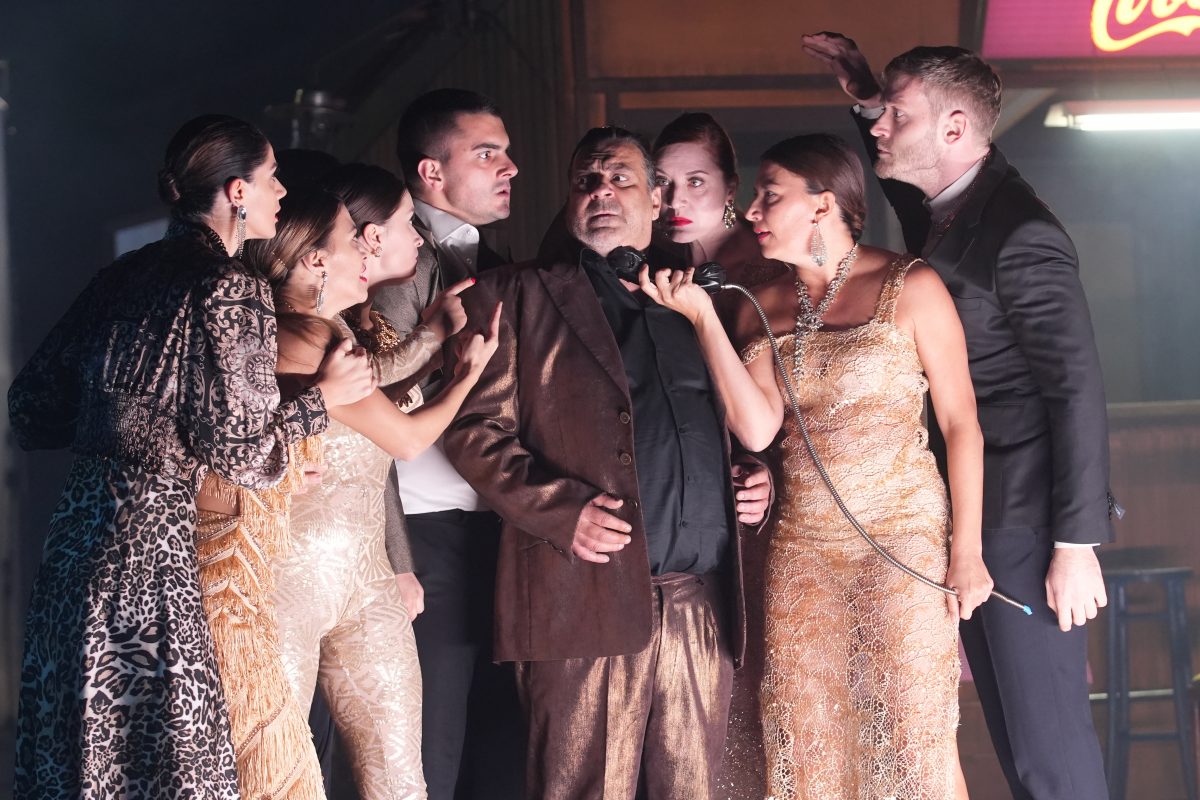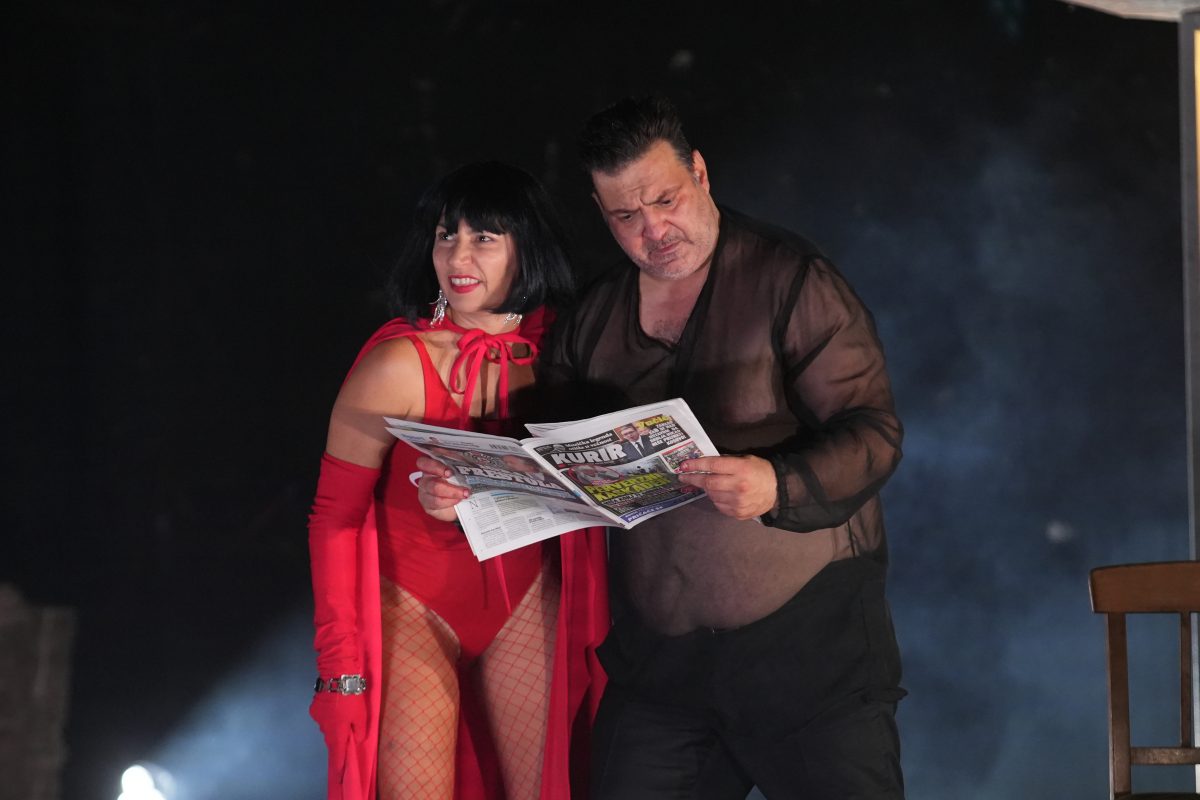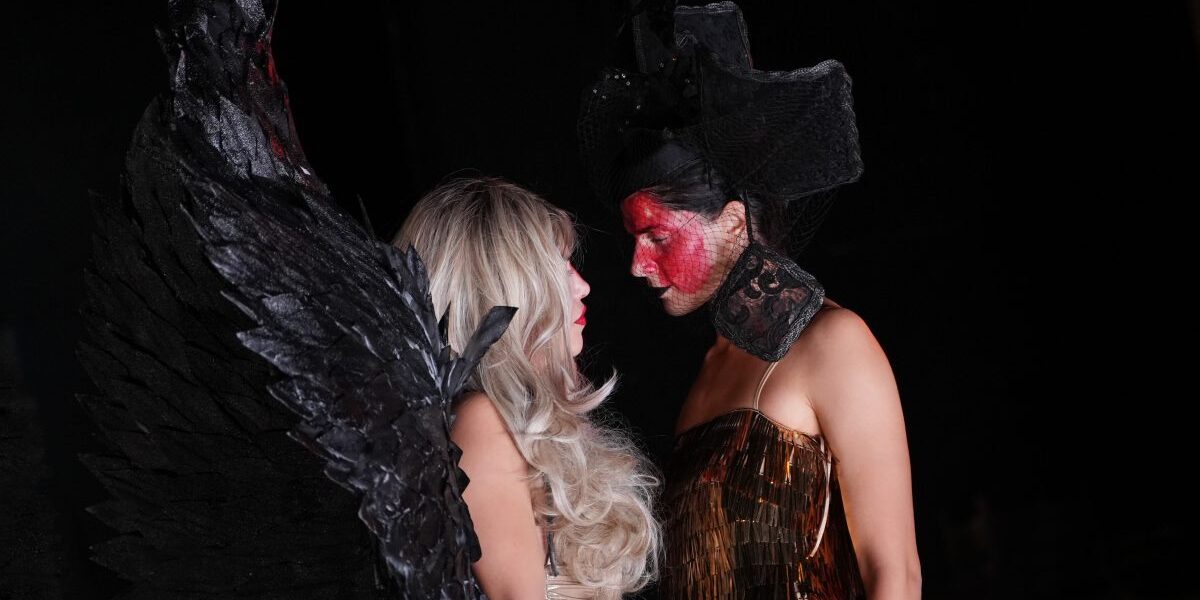Belgrade Drama Theatre, premiere 28th October 2022
Writing about Frank Castorf’s six-hour production of The Divine Comedy, the critic of the Serbian weekly Vreme, Marina Milivojević Mađarev, titled her text “When will it end?” She described the long and exhausting experience of seeing the play and the audience that left the theatre en masse at the first opportunity.
When I went to see the second reprise, the auditorium was only half full. Perhaps word got around that people were leaving the performance early, or they were discouraged by the six-hour running time. The fact the show was the work of the famous German director Frank Castorf and that the Belgrade Drama Theatre evidently allocated enormous funds to make the play happen, has not helped to attract and retain an audience.
However, for everyone who finds this production hellish, there will also be some who find it a heavenly experience. Those who made until the end, rewarded the actors with such loud applause it reached the intensity of a full auditorium.
Not all the reviews have been negative. In the weekly NIN, the critic and BITEF festival director Ivan Medenica in the weekly NIN, a connoisseur of the German theatre scene, points out in his very positive review that Castorf’s work is as ambitious in Belgrade, as it is in Germany. So, is this production, an expensive gamble for Belgrade Drama Theatre, a debacle or a success?
This is not an easy question to answer. First, it is only partly a Divine Comedy. It also includes Peter Handke’s novel The Goalkeeper’s Fear of the Penalty and an essay by the Russian poet Osip Mandelstam entitled Conversation on Dante. These three texts alternate with some other writings and comments by the actors themselves, who talk, for example, about how they understand Dante.
Everything happens at a rapid and dynamic pace. At one point Joseph Bloch, the main character from Handke’s novel, who doesn’t understand the world he lives in, wanders aimlessly around and kills almost randomly and without reason. Then we see scenes from The Divine Comedy, mainly from Inferno, shown in a contemporary context. Then we hear reflections on poetic language and Dante’s epic. We even get a history of the conductor’s baton at one point.

The Divine Comedy at Belgrade Drama Theatre
The performance does not take place solely in the Great Hall of the Belgrade Drama Theatre, the actors also descend into the space under the stage; they go into the technical department, they enter the dressing rooms and the offices set up for the play, then the sauna and the portable restaurant that have been built on the stage, and even go out into the street (the scenographer is Aleksandar Denić, who often works with Frank Castorf).
As they move between these various locations, they are accompanied by a cameraman and a sound technician. The audience can follow everything on a big screen on stage. Often, we see the same scene from a double perspective, live and on screen.
The actors often change costumes. The wardrobe is extravagant, made up of colourful dresses, eccentric suits, some of the costumes resemble those of circus performers, others are reminiscent of depictions of ancient deities. There are wings, red underwear and a cape with the Coca Cola sign that brings to mind Superman’s costume (costume design: Adriana Braga Perecki).
The design features numerous motifs from pop culture and modern consumer society. There is a big sign that says: “Heaven is a place where nothing ever happens”. This is a line from the song Heaven by the Talking Heads, songs by Nat King Cole, Bob Dylan, songs in Italian, German and Serbian. There are commercials for tomatoes and ketchup that the actors are trying to eat. Headlines from the daily tabloid Kurir are read out. A large Darth Vader head is present. There is a scene in which Josip Broz Tito appears. In another scene, Dante is slashed with a cleaver, and his blood is boiled and served to Beatrice. There are slot machines. The actors take a bath. Calls are made on pay phone. There’s a lot going on.
The acting style is theatrical, the words spoken in an emphatic, grand fashion, sometimes interrupted by private speeches from the actors, who are often in these moments out of character.
Throughout the performance, Castorf juxtaposes traditional and modern styles, classical and new texts, references to artistic literature and popular culture. He does this in the post-dramatic sense, which resists a coherent and hierarchical presentation. Motifs, actions and gestures accumulate and multiply without clearly defined meaning. This is what the German theatre expert Hans-Thies Lehmann calls the ‘retreat of synthesis’ or the self-cancellation of meaning. The director deliberately creates an eccentric and crowded theatrical world in which there is an abundance of familiar content, but in larger-than-life, parodic, serious, satirical and energetic ways.
How should we respond to a performance which is more an experience than an interpretation? Another German theatre scholar, Erika Fischer-Lichte, would say that the meanings that arise from such events are emergent. The material nature of theatre awakens associations, ideas, memories and feelings in the audience that emerge immediately but do not remain in consciousness for long. The objects are perceived as they are and have no relationship to each other. Perhaps it is this lack of conventional dramatic approach, in which all the theatrical elements are subordinate to the meaning, was what repelled Belgrade audiences.

The Divine Comedy at Belgrade Drama Theatre
On the other hand, perhaps there really is something nonsensical about Castorf’s direction on this case. Castorf’s German productions often last about five or six hours, are recorded with a camera; they refer to a million things and everything happens in disorderly manner. Castorf’s deconstructions can be read as critiques of life’s injustices. In one of his productions, people saw in his direction a critique of the repressive control of the GDR. Later. you could discern in his work that life in post-communist Germany was miserable and insecure. Now his work can be read as critique of capitalist consumerism and materialism.
One has the impression that this director works according to a tried and tested formula. He freely handles the various textual materials and transforms them into a series of seductive situations that can be understood in countless different ways. Castorf’s The Divine Comedy lacks an interpretive key with which we could unlock each segment of the harmonious organic whole.
Any kind of traditional analysis is difficult here. The performance itself resists it. At the same time, the performance feels like a thoughtful work. The direction is technically perfect. No matter how long, drawn out and inaccessible the staging is, it holds the attention, and many scenes stick in the memory. Belgrade Drama Theatre’s ensemble of actors have never performed with so much commitment, coordination and energy.
If you are to enjoy this carnival of theatrical possibilities, you need to relax and let yourself go. You’ll be rewarded with stylised scenes from the harsh world you live in, extremely talented direction, superb acting and technical perfection. Come unencumbered, and you may be captivated by the theatre experience. But if this doesn’t happen to you, don’t worry, it’s not your fault. This kind of Dadaist, rebellious theatre is not everyone’s cup of tea. But that doesn’t mean it’s not good, Belgrade Drama Theatre are just catering to an audience with a specific artistic taste.
Photos by Dragana Udovičić
For tickets and more information, visit: bdp.rs
Further reading: Andrej Čanji’s review of Macbeth at Belgrade Drama Theatre
Further reading: Natasha Tripney’s review of Antigone at Belgrade Drama Theatre
Andrej Čanji is a theatre critic and theatrologist based in Belgrade.








